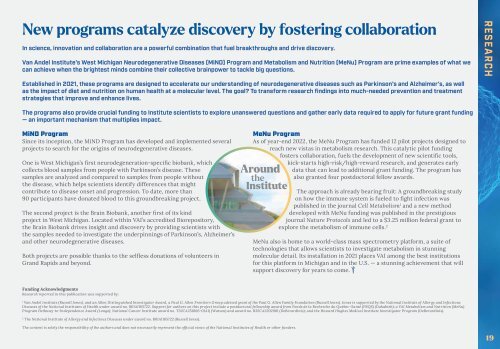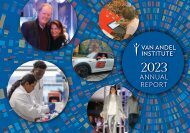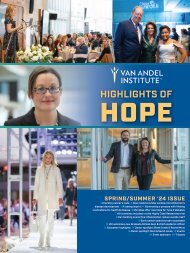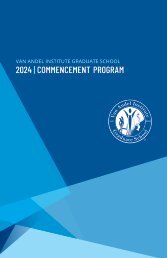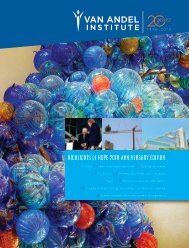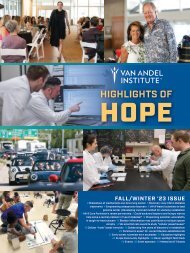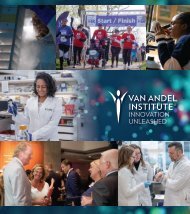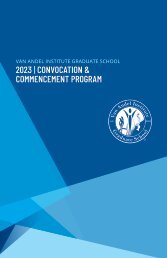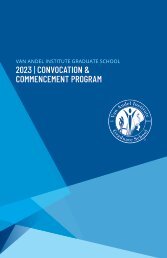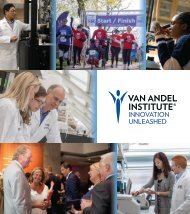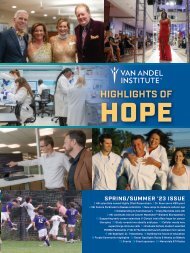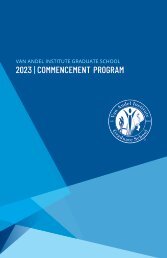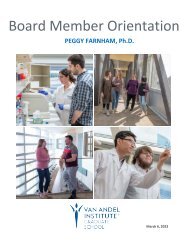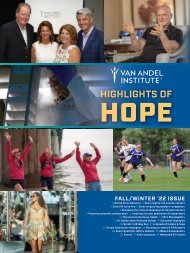2022 Annual Report
This is the 2022 Annual Report for Van Andel Institute.
This is the 2022 Annual Report for Van Andel Institute.
Create successful ePaper yourself
Turn your PDF publications into a flip-book with our unique Google optimized e-Paper software.
New programs catalyze discovery by fostering collaboration<br />
In science, innovation and collaboration are a powerful combination that fuel breakthroughs and drive discovery.<br />
Van Andel Institute’s West Michigan Neurodegenerative Diseases (MiND) Program and Metabolism and Nutrition (MeNu) Program are prime examples of what we<br />
can achieve when the brightest minds combine their collective brainpower to tackle big questions.<br />
RESEARCH<br />
Established in 2021, these programs are designed to accelerate our understanding of neurodegenerative diseases such as Parkinson’s and Alzheimer’s, as well<br />
as the impact of diet and nutrition on human health at a molecular level. The goal? To transform research findings into much-needed prevention and treatment<br />
strategies that improve and enhance lives.<br />
The programs also provide crucial funding to Institute scientists to explore unanswered questions and gather early data required to apply for future grant funding<br />
— an important mechanism that multiplies impact.<br />
MiND Program<br />
Since its inception, the MiND Program has developed and implemented several<br />
projects to search for the origins of neurodegenerative diseases.<br />
One is West Michigan’s first neurodegeneration-specific biobank, which<br />
collects blood samples from people with Parkinson’s disease. These<br />
samples are analyzed and compared to samples from people without<br />
the disease, which helps scientists identify differences that might<br />
contribute to disease onset and progression. To date, more than<br />
90 participants have donated blood to this groundbreaking project.<br />
The second project is the Brain Biobank, another first of its kind<br />
project in West Michigan. Located within VAI’s accredited Biorepository,<br />
the Brain Biobank drives insight and discovery by providing scientists with<br />
the samples needed to investigate the underpinnings of Parkinson’s, Alzheimer’s<br />
and other neurodegenerative diseases.<br />
Both projects are possible thanks to the selfless donations of volunteers in<br />
Grand Rapids and beyond.<br />
MeNu Program<br />
As of year-end <strong>2022</strong>, the MeNu Program has funded 12 pilot projects designed to<br />
reach new vistas in metabolism research. This catalytic pilot funding<br />
fosters collaboration, fuels the development of new scientific tools,<br />
kick-starts high-risk/high-reward research, and generates early<br />
Around<br />
the<br />
Institute<br />
data that can lead to additional grant funding. The program has<br />
also granted four postdoctoral fellow awards.<br />
The approach is already bearing fruit: A groundbreaking study<br />
on how the immune system is fueled to fight infection was<br />
published in the journal Cell Metabolism 1 and a new method<br />
developed with MeNu funding was published in the prestigious<br />
journal Nature Protocols and led to a $3.25 million federal grant to<br />
explore the metabolism of immune cells. 2<br />
MeNu also is home to a world-class mass spectrometry platform, a suite of<br />
technologies that allows scientists to investigate metabolism in stunning<br />
molecular detail. Its installation in 2021 places VAI among the best institutions<br />
for this platform in Michigan and in the U.S. — a stunning achievement that will<br />
support discovery for years to come.<br />
Funding Acknowledgments<br />
Research reported in this publication was supported by:<br />
1<br />
Van Andel Institute (Russell Jones), and an Allen Distinguished Investigator Award, a Paul G. Allen Frontiers Group advised grant of the Paul G. Allen Family Foundation (Russell Jones). Jones is supported by the National Institute of Allergy and Infectious<br />
Diseases of the National Institutes of Health under award no. R01AI165722. Support for authors on this project include a postdoctoral fellowship award from Fonds de la Recherche du Québec–Santé (FRQS) (Dahabieh); a VAI Metabolism and Nutrition (MeNu)<br />
Program Pathway-to-Independence Award (Longo); National Cancer Institute award no. T32CA251066-01A1) (Watson) and award no. R35CA2202901 (DeBerardinis); and the Howard Hughes Medical Institute Investigator Program (DeBerardinis).<br />
2<br />
The National Institute of Allergy and Infectious Diseases under award no. R01AI165722 (Russell Jones).<br />
The content is solely the responsibility of the authors and does not necessarily represent the official views of the National Institutes of Health or other funders.<br />
1519


